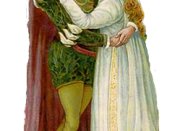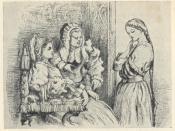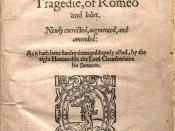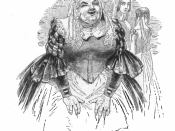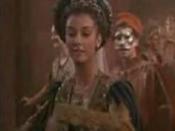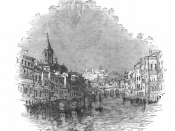"Two households, both alike in dignity,
In fair Verona (where we lay our scene),
From ancient grudge break to new mutiny,
Where civil blood make civil hand unclean,
From forth the fatal loins of these two foes,
A pair of star crossed lovers take their life."
I quote this, as these six lines outline the whole play. By telling the audience this in the prologue, Shakespeare is using dramatic irony. We already know that Romeo and Juliet have to meet at some time, and, eventually will die.
To set the scene, Juliet, the stunning, only daughter of Capulet, is destined by arrangement to marry Paris. Her father has thrown a great party with expectations for Paris to court Juliet. There in disguise, Romeo, a Montague, his heart is stricken for love of fair Rosaline. He has gate crashed the party with his friends, persuaded, only with the thought of seeing Rosaline.
As spectators we innocently expect all to go to plan, Romeo with Rosaline, Juliet with Paris. How wrong we are. Yet without the twists and turns that take place at this party we would not have a play.
The scene opens with a busy atmosphere, portrayed by the servingmen who are rushed off their feet. "Away with the join-stools, remove the court-cupboards, look to the plate." This is a major contrast from Act1 Scene1 where every one is fighting. The aggression is replaced with happiness and the expectation of a great party to come. The speech made by Capulet shows that he is proud that he can afford to throw such an extravagant party and he wants all his friends to enjoy it. "How long is't now since last yourself and I were in a mask?" By saying this Capulet is adding a touch of memory to his speech, he is looking back and remembering when he himself was courting his mistress in the same manner he expects Paris to do.
When Romeo first sees Juliet he describes her as a vision. This is an example of a soliloquy. When Romeo speaks his thoughts aloud, for the benefit of the audience. Romeo's speech is in the form of rhyming couplets that compare, Juliet with a burning torch and a rich jewel. How one person can deserve so much flattery I am still yet to understand. The way in which Romeo beholds Juliet would nowadays be looked down on with distaste and labelled as shallow, but, back in Shakespeare's day people did not seem to mind that. He compares her "as a rich jewel in an Ethiop's ear" to emphasize the fact that she stands out from others. This poem is completely different for the opening speech made by Capulet as it is much more serious than the light-hearted remarks made to welcome in the guests.
After Romeo's romantic speech, Tybalt notices his presence from across the room and is immediately angered. This is a contrast, from the romantic thoughts that Romeo has been thinking, to the harsh words from Tybalt. "Fetch me my rapier boy". This demonstrates that Tybalt is not scared to fight, thinking that Romeo is here only "to scorn at our solemnity". The aggression that wells up inside him is met by a vicious attack from Capulet. Using insults such as "goodman boy" and "princox" he stages an attack on his "saucy" nephew. Capulet is literally prepared to forfeit all the wealth of Verona to protect his party from Tybalt's wrath and blood feud. He is worried it would ruin the atmosphere for the guests if Tybalt was to draw his sword. Capulet is angered that anyone should challenge his authority, especially some one younger.
When Romeo first meets Juliet there is a dramatic effect made by the use of poetry. The 14 line sonnet, shared by the lovers has many references to religion. As they toy with the idea of a holy pilgrim, Romeo's thoughts of Rosaline are now forgotten. Such continual reference to religion so early on, suggests that marriage is already on the young lovers minds. This sudden burst of romance, sealed with a kiss, is a big contrast to the violent wrath of Tybalt.
This speech made by the young lovers is a classic example of 'dramatic irony'. As we already know they are from different families, we almost feel uncomfortable watching them and knowing of their unhappy relationship to come.
Disaster strikes! After the lovers first meeting they are separated by Juliet's nurse. "Your mother craves a word with you". The mention of a family member stirs some interest deep in Romeo's mind. "What is her mother?" When Romeo finds out that Juliet is a Capulet, he is deeply upset. The atmosphere is tense for the audience as we have already been dreading the out come of the young lovers evening. Then it's Juliet's turn. "Come hither, nurse. What is yond gentleman?" Nurse does not know. "Go ask his name." When Juliet finds out that Romeo is a Montague, she is equally disappointed. "My only love sprung from my only hate! Too early seen unknown, and known too late!" The atmosphere has changed dramatically from that of their first meeting. The happiness and joy, replaced with disappointment and sadness. The scene ends with Juliet, all colour drained form her face, brought to bed by her nurse.
In my eyes, this scene is the most important scene of the play. The scene is the start of the love story that "Is now the two hours' traffic of our stage." Shakespeare has made this scene very dramatic to play on the emotions of his audience. The scene goes from the busy bustle of the servingmen, to the opening speech made by Capulet. From the wroth of Tybalt to the romance of Romeo and Juliet's first meeting. Then finally the disappointing truth about their family differences. The idea of two enemies united by two lovers is still a recognisable theme in film and theatre today. But unfortunately hate and love, never go together.
People think that the ending of Romeo and Juliet is tragic, but I like to think of it as a happy ending. Romeo and Juliet were never going to be content on earth. Their deaths not only unite two families but also means they can be happy in heaven.
